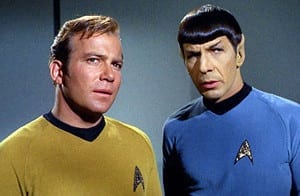| “Space: the final frontier. These are the voyages of the starship Enterprise. Its five-year mission: to explore strange new worlds, to seek out new life and new civilizations, to boldly go where no man has gone before.”
Just as Captain Kirk and Spock ventured to new worlds and made tough decisions to steer the Enterprise to safe ground, sales executives also have to make the right decisions to drive their organizations to hit their sales targets. With all of the hype around data science, it’s fair to ask what role sales leaders will play in the future—will they become obsolete and replaced with intelligent sales machines? Or, will machines be set aside because they will never match the ability of seasoned sales executives to take into account the myriad intangibles that can influence or impact a deal, many of which are not going to be captured by computers. Spock represents the logical, data-driven (machine-like) approach to decision making, while Captain Kirk relied mainly on his training, experience and instincts to get the crew out of a tight spot. Ultimately, the Enterprise completed its mission because Kirk and Spock often collaborated to find the right answer together—demonstrating how successful man machine collaboration could be. Machines (at least for the foreseeable future) do not have emotions, and we know emotions can be magic. Emotions can be incredibly positive, supplying us with goals and motives which drive enormous success and amazing achievements. However, emotions can also make us turn a blind eye to data, and perhaps overlook the obvious in our haste for success or fear of failure, ignoring contrary information. The fact is, better decisions are made when both machines and people work together—in space or here on Earth. Data science can support sales leaders by allowing them to focus on the complexities, nuances, subtleties, and the intangibles in a highly dynamic environment. It can provide information based on patterns and signals that can be extracted from available enterprise information sources, and free up the leader from the drudgery and tedium of sifting through tons of data. Here are examples of how data insights can complement business acumen. In a not uncommon scenario, the sales rep or manager whose commission (and sometimes job) is on the line is inclined to let desire, wants or needs overcome common sense and ask to discount price significantly to get a deal done when data science will indicate that the prospect is not ready to buy and the business is at risk of negotiating against itself and sacrificing profitability and margins. In another scenario, it’s the beginning of the quarter, your forecast looks healthy and bookings are on track to meet the quarterly plan. Then thirty days into the quarter, data science shows you are projected to be off track from where you need to be as the quarter progresses. You might have a gut instinct or some top level insights for why the projection is low with simple tools, but data science can extract patterns to show you that you have one region with a weak pipeline, one product line that has plateaued in sales, and 20 high value deals sitting with five sales managers that have stalled. In this scenario, you can take action right away to reallocate resources and put together targeted plans to get back on track. And of course, there are many times that the sales rep or manager will override data science because their experience and judgment tells them that there is likely not enough information for the science to be reliable. We need Spock or deep learning to help temper the emotion when it leads us astray. We need to trust our abilities and our judgment to confidently override machines when appropriate. Sales leaders are responsible for and incented to maximize revenue. Data science in context, allows sales leaders to evaluate, analyze, and make decisions to be successful in their mandate, and assume an elevated role within the C-Suite and with the Board. I think that both Spock and Kirk would agree that it’s the right way to “boldly go” where no company has gone before. K. V. Rao is co-founder and CEO of Aviso.
|




